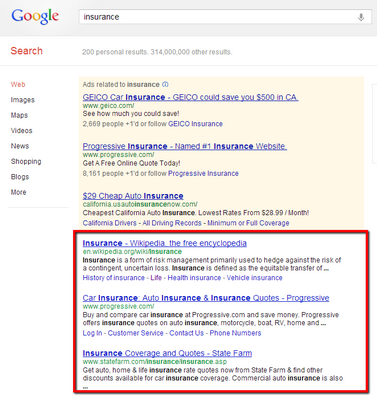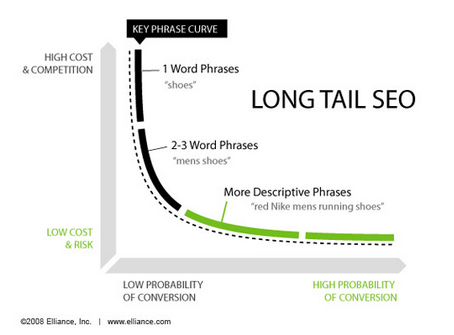Search is based on intent.
Which means people type in exactly what they’re looking for.
They use words and phrases to describe something they’re actively researching, like a solution to a problem, or an answer to their query.
Some words and phrases are used more often than others. And some are used hundreds of thousands of times per day.
When someone searches for something specific, the search engine responds by providing what it thinks is the best, most accurate results. They determine this based on a variety of factors, including trustworthiness, authority on a particular subject, and more.
So if you can get your company’s homepage to rank well for one of these popular keyphrase searches, then you could instantly get hundreds of visits per day (and possibly generate thousands of dollars in revenue — on one keyphrase).
And that was the philosophy behind old, traditional keyword strategies…
The Traditional Keyword Strategy that No Longer Works
Years ago, one of the main SEO keyword strategies was to get your website (i.e. homepage) to rank really well for one or two big, popular keyphrases.
You would find the biggest potential targets, and then use it repeatedly through-out your website. Here’s how it played out in practice:
- Focus on one or two main, popular keyphrases
- Buy or swap backlinks with exact-matching anchor text
- And optimize only the homepage so your website ranks well for those two popular keyphrases
The biggest problem with this strategy? It doesn’t work. Not anymore.
SEO is more sophisticated today, so it takes a lot more than keyword stuffing and buying links to rank for a popular keyphrase.
And your competition is smarter (not to mention better funded). so you can’t bank your whole strategy on one or two keyphrases.
For example, take a look at the search results for a major keyphrase like “Insurance”.
What do you notice?

You see huge brands like Wikipedia, Progressive, State Farm.
There is no way you can compete for these major keyphrases with huge companies that have been around for decades.
There are a few obvious reasons for this:
- SEO can get extremely, technically difficult. And most small or medium sized companies don’t enough time or knowledge.
- Search engines reward sites that have been around longer and have more “authority”. This is easy for large companies who run mass-media advertising and everybody recognizes.
- And finally, large brands spend hundreds of thousands of dollars each year on SEO. They can hire the best and brightest to focus only on SEO, while most small and medium sized organizations have to juggle different tasks.
Besides… you shouldn’t necessarily care about keyword rankings.
How to Get SEO Traffic that Will Turn into Loyal Customers
It’s extremely rare for someone to land on your website and buy something immediately.
This is especially true if someone is using a vague, generalized keyphrase. Take a look at this example:

Someone looking for the popular keyphrase like “shoes” is just browsing around. They’re probably not ready to buy, because they aren’t even researching a particular type or category of shoe.
However when someone searches for “red Nike mens running shoes” is much more likely to make a purchase. They have a specific brand, color and category in mind.
Sure, this descriptive, long-tail search won’t happen as often as someone searching for “shoes”.
But your goal with SEO is to SELL, not RANK.
The Keyword Strategy You Should be Using to Get More Customers
Your business is for someone specific.
A specific target market, audience or community.
You have products and services specifically tailored to solve this market’s problems.
Every business card, any type of brochure even a tri fold brochure, and advertising piece is scrutinized to meet their expectations.
But when you move online… that message is lost.
Each page is generalized, intended for a mass audience.
The result is low (or no) sales.
But you don’t want a mass audience. You want a specific audience. The audience who wants what you sell, and is actively looking for you online.
In SEO, that means using a long-tail keyphrase strategy because (1) it’s easier to rank, (2) the traffic you get is more targeted, which means (3) your conversion rates will increase and (4) your sales will increase


